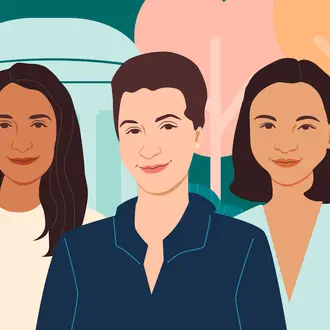Coming to MIT had always been a dream for Dar Maor, MBA ’21. After serving five years in the Israeli military, she chose to pursue a dual undergraduate degree in accounting and economics at Tel Aviv University. Following graduation, Dar joined PwC as a consultant, but soon realized that she wanted to follow a general management path. To take her leadership experience to the next level, she enrolled in the MBA program.
Dar Maor, MBA '21
What originally drew you to MIT Sloan for your MBA?
I began my career in the Israeli military as an intelligence officer commanding a department of 40 soldiers. It was a significant leadership experience that not only opened my eyes to what being a good leader means—a combination of being a visionary and a coach, resilient and agile—but also shaped how I want to make an impact on people and the world. As I transitioned into finance, I continued to reflect on my leadership experience in the military and the importance of motivating people to increase organizational performance. I knew that an MBA from MIT Sloan would give me the advanced leadership skills I needed to move into a general management position and contribute to a larger team or organization.
What was your initial reaction when you arrived on campus?
When I came to campus for AdMIT Weekend, I was able to see firsthand the collaborative culture of Sloan and the learning-by-doing approach that I had heard people talk about. I was amazed to see how it all fit perfectly into the picture that I had in mind of the skillset a strong leader should have. After visiting, I knew that this would be a place where I could make a difference, even as a student, with the support of my fellow classmates and faculty.
In what ways did you experience that learning-by-doing approach during your first year?
The entire environment at Sloan is meant to cultivate innovation and problem solving, beginning with the core semester. In my Organizational Processes class, our team created a playbook to help a healthcare startup scale efficiently. During second semester, in my Branding class, we used consumer behavior analysis to develop a branding strategy to reposition a large fashion brand into the luxury market. I learn so much from collaborating with my peers, and love the opportunity we have to help companies in a tangible way.
I am looking forward to the things we will accomplish together in our final year. One class I am particularly excited about this semester is Strategies for People Analytics, where we will help companies understand how to use people data to improve business performance. Understanding people is not always easy, and data may come to our rescue when looking for meaningful insights.
How have you been able to flex new leadership skills outside of the classroom?
I knew how quickly these two years would fly by, so I made a point of getting involved in several groups like the Operations Management Club, the MIT Sloan Retail and Consumer Goods Club, and the Retail and Consumer Goods Conference. Last year, the conference focused on how technology and analytics are informing and reshaping the retail industry. I was responsible for targeting and recruiting innovative retail startups to exhibit their work in our startup expo. It was a great opportunity to hone my networking and persuasion skills.
You were also one of the student leaders planning the Israel Trek. How did you adjust in response to the pandemic?
Because of my Israeli military background, I’m very patriotic and was excited to lead the Israel Trek—the largest student-run trek at Sloan. We spent hundreds of hours planning the trip for our fellow Sloanies, curating a fantastic experience to spotlight the best of our country. We were disappointed to cancel the trip last spring, but that experience forced us to be adaptive and creative leaders. To keep the hype going, we sent books on Israel’s culture and history to all the participants, so they could learn about the country. Now we’re planning cooking classes, speaker series and live virtual tours, and thinking about new ways to showcase Israel’s culture virtually.
COVID-19 definitely forced the Sloan community to be flexible and pivot. How did you see the community react?
It’s been very inspiring to see how resilient everyone has been, and how quickly people jumped to action. Right away, students stepped up to form a COVID-19 working group to give students a voice and support fellow students socially, academically, and emotionally during the initial phase of the pandemic. One major thing that came out of this working group was the MIT Sloan Hack-a-thon which ended up gathering over 200 people from the community to present and hear ideas at pitch night. Some outcomes include pilots of a virtual E62 café, new tools for online collaboration and social gatherings, and outdoor seating on Sloan's campus.
What role did you have in the COVID-19 working group?
Last year, I had my first child, so I wanted to make sure that we were supporting our fellow Sloanies who are parents. I called all Sloan parents to action, and together we began sharing challenges and brainstorming possible solutions. We also worked with Sloan faculty and administration to implement some support for Sloanies and their significant others, who were juggling working from home with caring for children.
Why are you proud to be a Sloanie?
The energy of the MIT Sloan community reflects who I want to be as a leader. I want to be able to react to change—not freeze—and pivot to create something meaningful and significant for my community. This is a quality I see in so many of my classmates, and it is endlessly motivating. Looking ahead, I can't wait to see how each of us strive—in our own unique way—to become principled, innovative leaders who aim to improve the world.
Register your interest to learn more about the mit sloan mba program.



